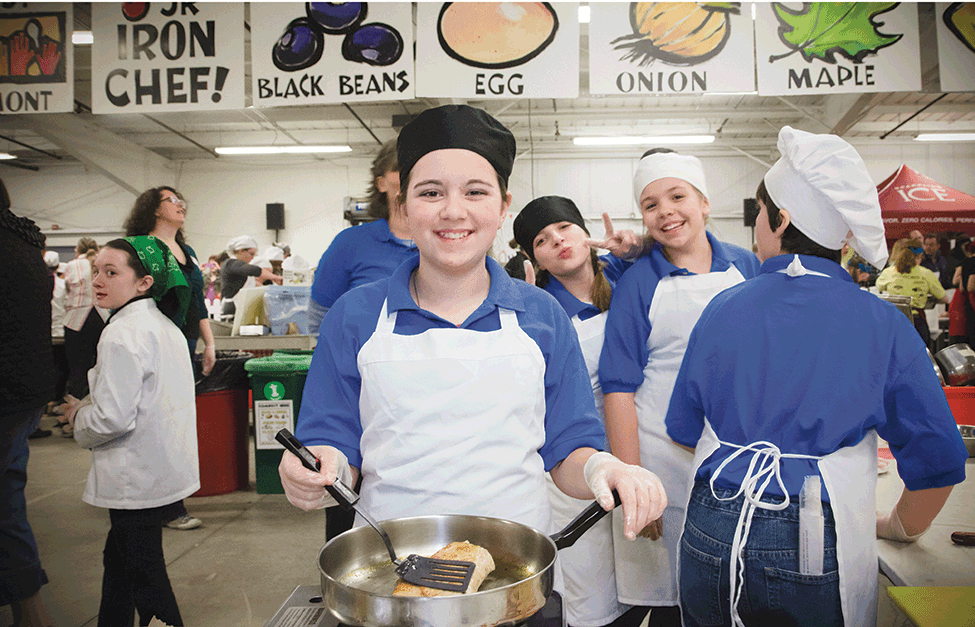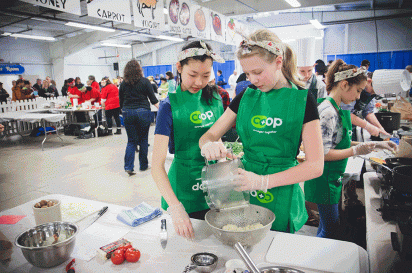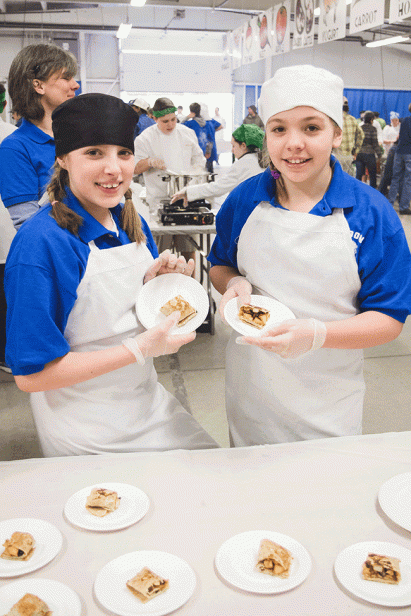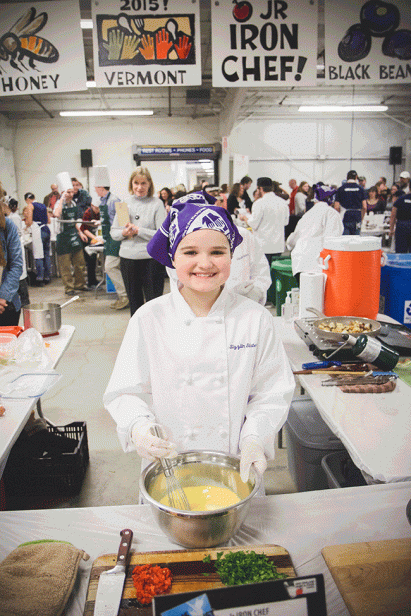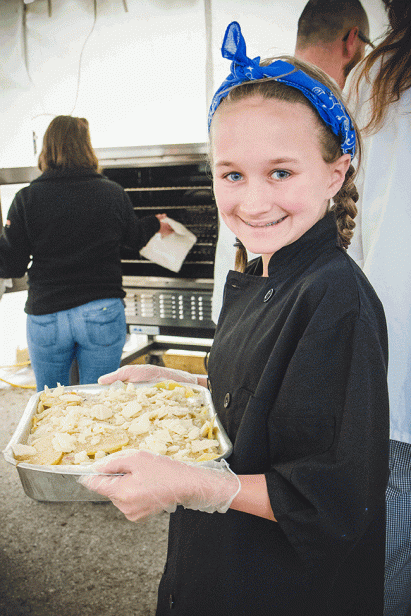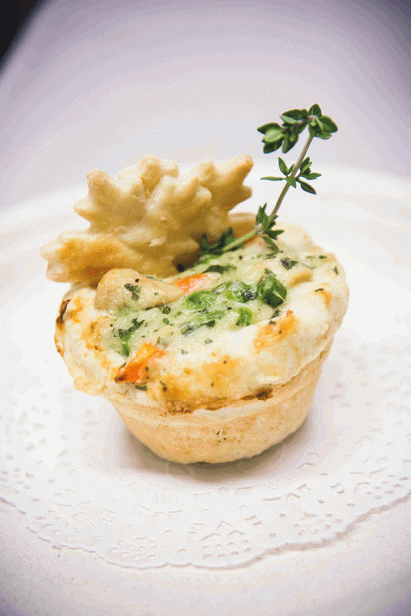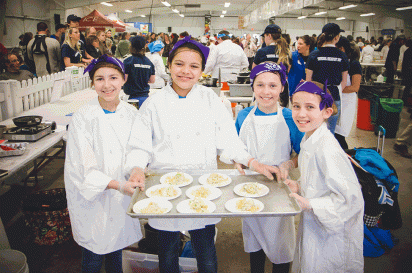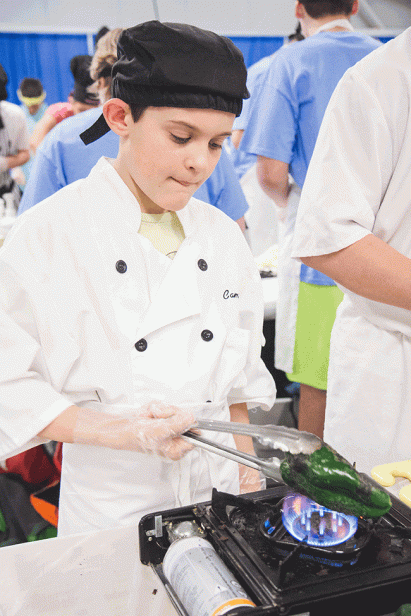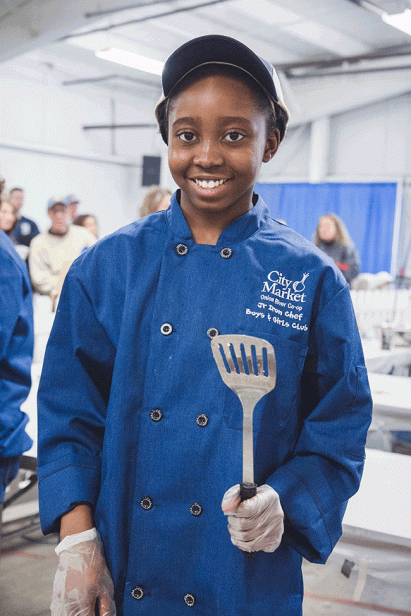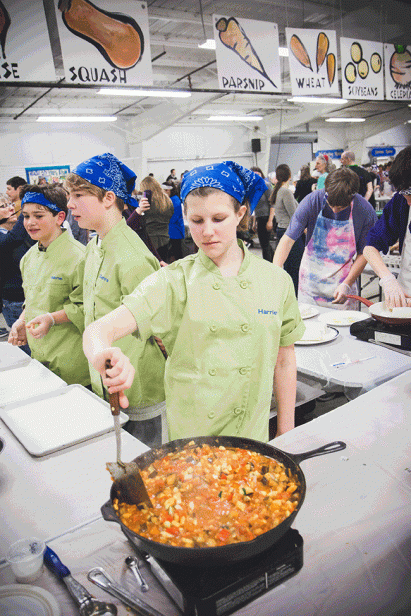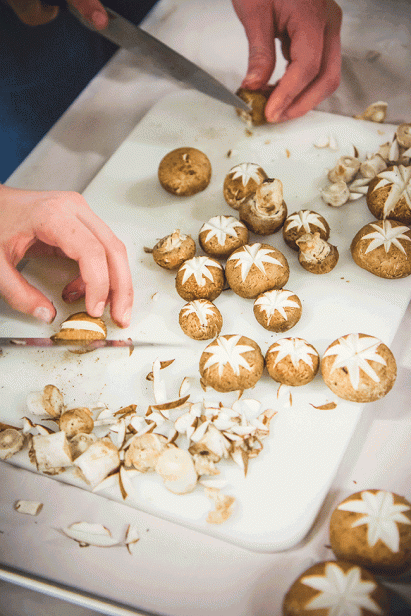Jr Iron Chef Vermont, a Pioneering Program
Good food beautifully balances flavors, and this team nailed it,” says Steve Learned, regional food service manager for the Abbey Group, studying his plate. “This dish really lets the root vegetables be the main presence.” Learned and I, alongside other local food aficionados, are in the Jr Iron Chef Vermont judges’ room at the Champlain Valley Exposition. We found another winning candidate: individual roasted root vegetable potpies topped with caramelized onions made by Tuttle Team Dicing Divas from Frederick H. Tuttle Middle School. The pies are filled with seasonal parsnips, carrots, sweet potatoes and other vegetables and made from scratch with whole-wheat dough. A fun spin on your standard pie, Tuttle Team’s pies are perfectly bite-size, with decorative edges and adorned with fresh herbs. They’re fit for kids and adults alike. I forget for a minute that they’re the creation of four middle-schoolers.
We’ve tasted many exciting dishes so far at Jr Iron Chef Vermont: a butternut squash and sweet potato soup, vegetarian stuffed chapati wrap, vegetable latke quiche with spicy pepper coulis and more. There are, of course, dishes where I’d suggest slight tweaks for flavor, doneness or texture. But anyone familiar with Iron Chef (which gave Jr Iron Chef Vermont explicit permission to use their name), or other television cooking shows, knows imperfection is par for the course in any time-pressured competition. Cooking is a true skill: art and science all brought together in a single dish.
Youth Chefs Face Real School Lunch Challenges
260 middle and high school contestants and their coaches—school food service directors, school teachers and local chefs—fill the floor of the Expo. Founded by Vermont Food Education Every Day (VT FEED, a partnership of NOFA-VT and Shelburne Farms) [note: I work full-time for Shelburne Farms] and the Burlington School Food Project (BSFP), Jr Iron Chef Vermont was one of the country’s first youth culinary competitions to focus on local food and school meals. This is its eighth year running.
The competition guidelines are rigorous, intended to demonstrate the real-life challenges that food services face in creating healthy meals for schools. All 62 Jr Iron Chef Vermont middle and high school teams are given just 90 minutes to prepare an original dish from scratch. Teams must highlight vegetables and source all ingredients themselves—locally, whenever possible. Dishes should be nutritious and, ideally, inspire school meal programs. No desserts allowed. Teams are evaluated not only on their final product—taste, presentation and creative use of food—but also on how they source ingredients, work together and cook, all the steps required to go from farm to plate.
Rewind to this morning’s heat. In the Expo hall, the judges are scoring mise en place. Mise en place, which literally means “set in place” in French, is about organization, cleanliness and safety while cooking. In other words: professionalism. I’m assigned three teams to observe. I jot down notes.
Team #19: holding onion steady with non-knife hand while curling fingers into claw around knife, tucking knuckles underneath. Proper knife skills, check. Team #20: ginger is grated, kale chopped, water portioned and spices measured. Spatulas are being laid out. Everything’s ready to make curry. Nice organization, check. Team #21: cleaning and wiping down their stations as they make pizza. One student tells another that she is walking behind him with a heavy pan. Good communication, check.
There is a sharp intensity in the air. It’s the third Jr Iron Chef Vermont I’ve participated in, and I’ve gotten chills each time. I think about how much more nerve-racking it would be to have a judge hanging over me and my cutting board as I prepare lunch, not to mention pick apart my finished dish. Then again, maybe my cooking techniques would be more finessed at this stage in my life.
Jr Iron Chef Vermont Teaches Lifelong Lessons
As the student chefs mix, flip and bake, I ask the crowd why Jr Iron Chef Vermont is important to them, when there are ski races, basketball games and music lessons to be had. Over and over again I hear: life lessons.
“I learned that you have to be careful cooking, and if there’s a bump in the road, you don’t quit,” says Melissa Gillich, one of four sixth-graders on a Randolph Elementary School team. All are wearing chef whites and bandanas around their hair, pulling it back. The fuel line on her team’s burner malfunctioned as they began making their Mean Green Macaroni (i.e., pasta featuring broccoli and cauliflower), which caused two mini-explosions. While many students, including Gillich and her teammates, declare that they’d like to become chefs when they grow up, they say they’re also learning about some of its realities, challenges and satisfactions.
Students on other teams tell me about their interest in learning about local food and agriculture. The Brattleboro Union High School team hadn’t known they could locally source tofu, which they wanted for their pad Thai. In their search, they learned about Vermont Soy tofu, made in Hardwick with traditional processing techniques using organic beans bought directly from local farmers. Teams also practice composting food. Thanks to the Chittenden Solid Waste District, competition organizers and students’ joint efforts, nearly 300 pounds of kitchen scraps will be diverted from the landfill and composted from today’s event.
Parents remark that in all the practicing for the competition, their children’s cooking skills have noticeably improved. Ronte Dubose, a parent of a Hunt School sixth-grader, tells me about how his daughter, Madilyn Bilodeau, is becoming a more confident cook and now uses the stove a lot more and handles a knife properly. Though Dubose is a professional cook himself, Bilodeau’s excitement around making food at home really took off while practicing for the competition. Her recipe repertoire has moved beyond just making eggs and boiling water for pasta.
Jr Iron Chef Vermont has practical applications for the classroom, too. Tracey Gamache, a science teacher at Twin Valley School District in Whitingham, is in her third year volunteering as a Jr Iron Chef Vermont coach. She integrated lessons into her eighth-grade team’s practice sessions. While developing their dish, corn chowder (or corn chowda, as the students named it) with cheddar scallion biscuits, Gamache’s students hypothesized which ingredient combinations and preparation techniques would mesh well to create delicious food. Following the process of experimentation they learned in science class, they tested and tinkered with their recipe until they were satisfied. When her students needed to scale up their recipe to prepare to serve it to their school when they returned from the competition, the eighth-grade team worked through math problems to figure out proportions for 200.
A Winning Competition
Since its founding in 2008, over 2,000 teens have participated in Jr Iron Chef Vermont. The event has more than doubled the number of participants, who come from every corner of the state. Jr Iron Chef Vermont participants are athletes, computer whizzes, band members and more. There are students who have competed five years in a row and students who are competing for the first time this year. Several schools now have to hold “cook-offs” to determine who will represent their school, since there are more students interested in participating in Jr Iron Chef Vermont than available slots. Students are selected based on criteria such as leadership, responsibility and attendance. No prior cooking experience is necessary, though the dishes have become more sophisticated in taste, presentation and creativity each year.
Best of all, the students love participating. Sofia Burrell, with Randolph Elementary’s sixth-grade team, describes cooking as “a combination of science and exercise” and calls Jr Iron Chef Vermont her “favorite activity absolutely.” And, yes, this means she likes practicing cooking for Jr Iron Chef Vermont even more than watching television. Her teammates nod in agreement. The four of them have been cooking together one to two times a week for the past three months, and all plan to compete again next year.
Jr Iron Chef Vermont’s impact is exponential in reach. Winning teams have the opportunity to share their farm-to-school experiences with legislators in the Vermont Statehouse as well as prepare their original recipes. And winners or not, students often go back after the competition to serve their dish to other students in their school. “The idea is that school meals are for everyone,” says Abbie Nelson, agricultural education coordinator at NOFA-VT and one of Jr Iron Chef Vermont’s lead organizers. She’s almost shouting, trying to talk over the crowd of teams bustling around us. “Jr Iron Chef Vermont and school lunches are about food access. No one is left out.”
Jr Iron Chef Vermont is just one example of the groundbreaking farm-to-school efforts happening in the state. Called “a pace-setter in the farm-to-school movement” by U.S. Senator Patrick Leahy (D-VT), Vermont has some of the country’s longest-standing farm-to-school programs. Thanks to the collective work of such organizations as VT FEED and BSFP, policymakers, food service professionals and willing students, more than half of Vermont schools are involved with farm-to-school programming today. And following the Jr Iron Chef Vermont model, organizations across the country are hosting their own teen cooking competitions, including in neighboring states New York and New Hampshire.
This year’s Jr Iron Chef Vermont is particularly well timed. Since last year’s competition, First Lady Michelle Obama and the White House administration began conversations about how to introduce basic culinary skills in schools as a way to promote healthier eating. Senators Patrick Leahy and Thad Cochran (R-MI) introduced the bipartisan Farm to School Act of 2015 to increase federal resources committed to bringing fresh, local foods to schools nationwide. VT FEED recently received a $100,000 grant through the U.S. Department of Agriculture’s Farm to School Program to support its groundbreaking work across the Northeast. These efforts are key when we think about the fact that students eat up to two-thirds of their daily calories in cafeteria food through school meal plans.
Initiatives like Jr Iron Chef Vermont help narrow the gap between consumers and producers, professional and amateur cooks, students and community members. This year’s competition is over, but I know it will have a long-term legacy. “Through practicing for the competition—learning to source local ingredients and prepare food from scratch—students are kindling a relationship with what they eat,” says Nelson. “Ultimately, we expect their experiences with Jr Iron Chef Vermont will help them make healthy choices throughout their lives.” I can already see this taking root around us. Meanwhile, I’m inspired to keep getting to know nearby farms and finding new ingredients so I can practice my knife skills and flavor combining at home.
Jr Iron Chef Vermont 2015 WinnersMise en Place:
For teams that show exemplary teamwork, order and professionalism
Vegetarian Bacon, Butternut Squash Pasta with Kale and Caramelized Onions by Sharon Sizzlers, Sharon Elementary School
Vegetable Curry and Rice by LCWS Wildcats, Lake Champlain Waldorf School
Le Petit Vegetarian Potpie by Green Mountain Le Petite Cheftains, Green Mountain Union High School
MVU Risotto with Asparagus by Thunder Chefs, Missisquoi Valley Union High School
Lively Local Awards:
For teams that best highlight Vermont foods
Stack & Cheese by Boys & Girls Club Middle School, Boys & Girls Club of Burlington
Pad Thai by Jalapeno Hotties, Brattleboro Union High School
First Day of Spring Rolls with Root Noodles and Miso by the Wolf Pack, Albany Community School
Vermont Root Vegetable Empanada with Maple Adobe Sauce by Ze Bon Chefs, Milton High School
Crowd-Pleaser:
For teams that best incorporate color, texture and taste for a true crowd-pleasing dish
Honey Lime Sweet Potato, Black Bean and Corn Taco with Chimichurri and Chipotle Cream by Sharon Sprouts, Sharon Elementary School
Vermont Pizza by CVU Chefhawks, Champlain Valley Union High School
Individual Roasted Root Veggie Potpies with Caramelized Onions by Tuttle Team Dicing Divas, FH Tuttle Middle School
Mayan Couscous Seared Wraps with Cream Sauce by All Wrapped Up, Twin Valley Union High School


